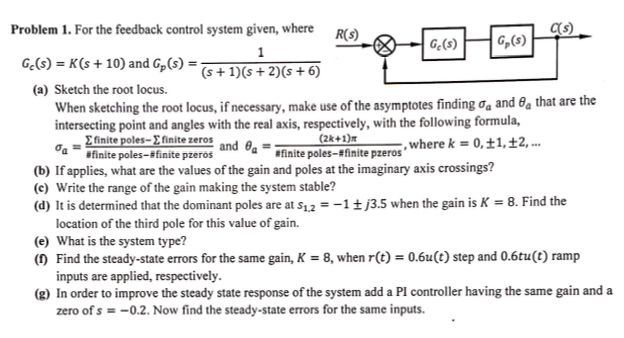Problem 1. For the feedback control system given, where R(s) G,(s) 1 G.(s) = K(s + 10) and G,(3) =; (s + 1)(s + 2)(s + 6) (a) Sketch the root locus. When sketching the root locus, if necessary, make use of the asymptotes finding ơ, and 8, that are the intersecting point and angles with the real axis, respectively, with the following formula, Efinite poles- E finite zeros afinite poles-#finite pzeros (2k+1)m and 0. = afinite poles-#finite pzeros" -, where k = 0,±1,±2, ... (b) If applies, what are the values of the gain and poles at the imaginary axis crossings? (c) Write the range of the gain making the system stable? (d) It is determined that the dominant poles are at s1,2 = -1t j3.5 when the gain is K = 8. Find the location of the third pole for this value of gain. (e) What is the system type? () Find the steady-state errors for the same gain, K = 8, when r(t) = 0.6u(t) step and 0.6tu(t) ramp inputs are applied, respectively. (g) In order to improve the steady state response of the system add a Pl controller having the same gain and a zero of s = -0.2. Now find the steady-state errors for the same inputs.
Problem 1. For the feedback control system given, where R(s) G,(s) 1 G.(s) = K(s + 10) and G,(3) =; (s + 1)(s + 2)(s + 6) (a) Sketch the root locus. When sketching the root locus, if necessary, make use of the asymptotes finding ơ, and 8, that are the intersecting point and angles with the real axis, respectively, with the following formula, Efinite poles- E finite zeros afinite poles-#finite pzeros (2k+1)m and 0. = afinite poles-#finite pzeros" -, where k = 0,±1,±2, ... (b) If applies, what are the values of the gain and poles at the imaginary axis crossings? (c) Write the range of the gain making the system stable? (d) It is determined that the dominant poles are at s1,2 = -1t j3.5 when the gain is K = 8. Find the location of the third pole for this value of gain. (e) What is the system type? () Find the steady-state errors for the same gain, K = 8, when r(t) = 0.6u(t) step and 0.6tu(t) ramp inputs are applied, respectively. (g) In order to improve the steady state response of the system add a Pl controller having the same gain and a zero of s = -0.2. Now find the steady-state errors for the same inputs.
Introductory Circuit Analysis (13th Edition)
13th Edition
ISBN:9780133923605
Author:Robert L. Boylestad
Publisher:Robert L. Boylestad
Chapter1: Introduction
Section: Chapter Questions
Problem 1P: Visit your local library (at school or home) and describe the extent to which it provides literature...
Related questions
Question
100%
Electrical Engineering course.
Course:
EE350 ( System Dynamics and control )

Transcribed Image Text:Efinite poles- E finite zeros and Oa = ainite poles-#finite pzeros where k = 0,±1,±2, ...
Problem 1. For the feedback control system given, where
R(s)
Gę(s)
G,(s)
1
G.(s) = K(s + 10) and G„(3) =;
(s+ 1)(s + 2)(s + 6)
(a) Sketch the root locus.
When sketching the root locus, if necessary, make use of the asymptotes finding ơa and 8a that are the
intersecting point and angles with the real axis, respectively, with the following formula,
(2k+1)m
afinite poles-ifinite pzeros
(b) If applies, what are the values of the gain and poles at the imaginary axis crossings?
(c) Write the range of the gain making the system stable?
(d) It is determined that the dominant poles are at s12 = -1 ± j3.5 when the gain is K = 8. Find the
location of the third pole for this value of gain.
(e) What is the system type?
() Find the steady-state errors for the same gain, K = 8, when r(t) = 0.6u(t) step and 0.6tu(t) ramp
inputs are applied, respectively.
(g) In order to improve the steady state response of the system add a PI controller having the same gain and a
zero of s = -0.2. Now find the steady-state errors for the same inputs.
Expert Solution
This question has been solved!
Explore an expertly crafted, step-by-step solution for a thorough understanding of key concepts.
This is a popular solution!
Trending now
This is a popular solution!
Step by step
Solved in 4 steps with 4 images

Knowledge Booster
Learn more about
Need a deep-dive on the concept behind this application? Look no further. Learn more about this topic, electrical-engineering and related others by exploring similar questions and additional content below.Recommended textbooks for you

Introductory Circuit Analysis (13th Edition)
Electrical Engineering
ISBN:
9780133923605
Author:
Robert L. Boylestad
Publisher:
PEARSON

Delmar's Standard Textbook Of Electricity
Electrical Engineering
ISBN:
9781337900348
Author:
Stephen L. Herman
Publisher:
Cengage Learning

Programmable Logic Controllers
Electrical Engineering
ISBN:
9780073373843
Author:
Frank D. Petruzella
Publisher:
McGraw-Hill Education

Introductory Circuit Analysis (13th Edition)
Electrical Engineering
ISBN:
9780133923605
Author:
Robert L. Boylestad
Publisher:
PEARSON

Delmar's Standard Textbook Of Electricity
Electrical Engineering
ISBN:
9781337900348
Author:
Stephen L. Herman
Publisher:
Cengage Learning

Programmable Logic Controllers
Electrical Engineering
ISBN:
9780073373843
Author:
Frank D. Petruzella
Publisher:
McGraw-Hill Education

Fundamentals of Electric Circuits
Electrical Engineering
ISBN:
9780078028229
Author:
Charles K Alexander, Matthew Sadiku
Publisher:
McGraw-Hill Education

Electric Circuits. (11th Edition)
Electrical Engineering
ISBN:
9780134746968
Author:
James W. Nilsson, Susan Riedel
Publisher:
PEARSON

Engineering Electromagnetics
Electrical Engineering
ISBN:
9780078028151
Author:
Hayt, William H. (william Hart), Jr, BUCK, John A.
Publisher:
Mcgraw-hill Education,